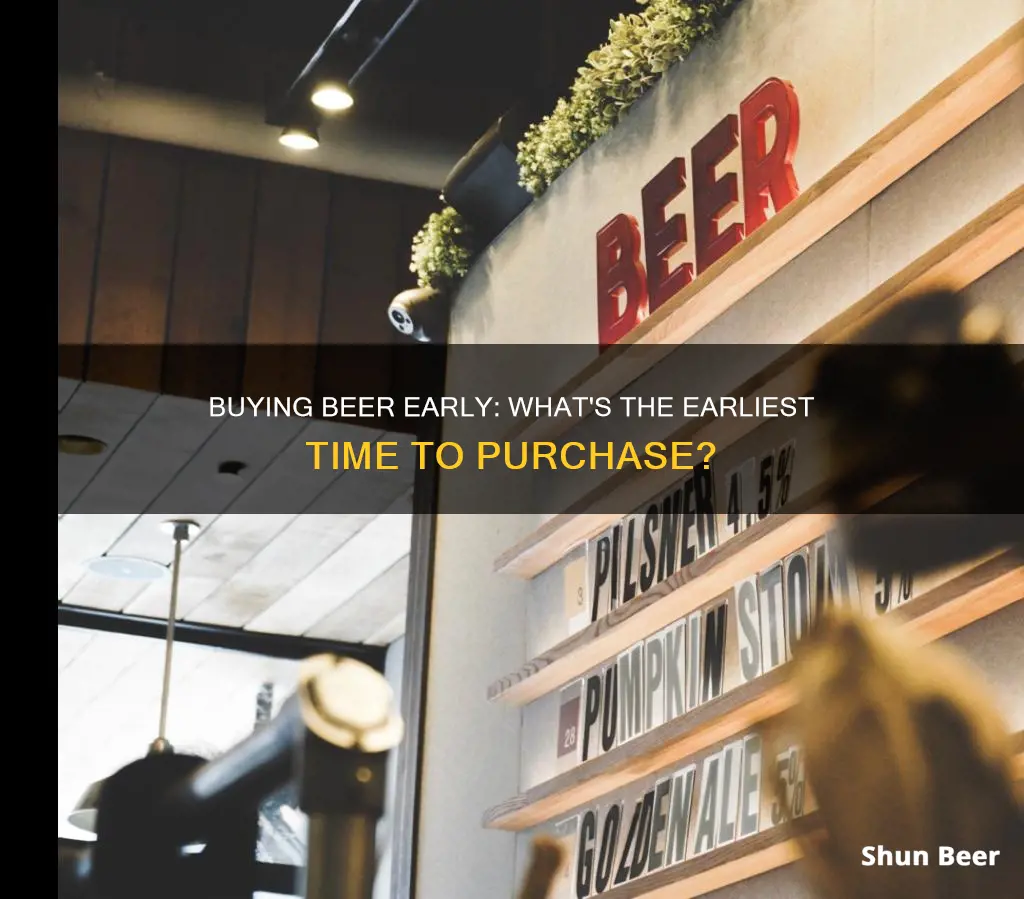
Texas has some of the most restrictive alcohol laws in the United States, with Sunday morning being a contentious time for buying beer. The current alcohol laws in Texas limit the sale of beer, wine, or liquor before 10 am on a Sunday. Grocery and convenience stores can sell beer and wine from 10 am to midnight on Sundays, and from 7 am to midnight Monday to Friday, and from 7 am Saturday until 1 am Sunday. Liquor stores are closed on Sundays, Thanksgiving, Christmas, and New Year's Day, and can only sell from 10 am to 9 pm Monday to Saturday.
| Characteristics | Values |
|---|---|
| Location | Texas |
| Day of the week | Monday to Saturday |
| Time | 7 a.m. to midnight |
| Day of the week | Sunday |
| Time | 10 a.m. to midnight |
| Day of the week | Sunday |
| Time | Before 10 a.m. |
| Status | Not allowed |
What You'll Learn

Beer can be bought at grocery stores from 10 am on Sundays
In Texas, liquor stores are closed on Sundays, but beer and wine can be purchased at grocery stores and markets on Sundays. Alcohol sales from Sunday to Friday stop at midnight, and on Saturdays, it ends on Sunday morning at 1 am.
The laws for buying alcohol in restaurants, liquor stores, and bars may differ. For example, in Texas, liquor can be purchased at bars and restaurants on Sundays, but only starting at 10 am, and only if food is also ordered.
California's Early Beer Buying: Legal Age and Time Limits
You may want to see also

Liquor stores are closed on Sundays
In Texas, liquor stores are closed on Sundays, as well as on Thanksgiving, Christmas, and New Year's Day. If Christmas or New Year's Day falls on a Sunday, liquor stores will remain closed on the following Monday. This law is a remnant of the state's "blue laws", which banned the sale of certain products, including liquor, on consecutive weekend days. While these laws were repealed in 1985, the sale of liquor on Sundays remains prohibited.
The justification for this restriction is based on public health and safety concerns, as well as the desire to curb excessive alcohol consumption and its consequences. Studies have shown a correlation between limiting the days when alcohol is sold and a decrease in alcohol-related crimes. For example, a study on the impact of repealing a Sunday alcohol sales ban in New Mexico found that alcohol-related vehicle crashes rose by 29% and alcohol-related crash fatalities jumped by 42% from 1990 to 2000.
However, other research suggests that repealing Sunday sales restrictions may not increase overall alcohol consumption but rather shifts public behaviour. A study of drinking habits in Ontario following the repeal of a blue law found that alcohol consumption increased on Sundays but decreased on Saturdays. Additionally, liquor store owners have found that being closed on Sundays mostly just shifts sales to other days, and being closed for a day reduces their expenses and is popular with their staff.
While you cannot purchase liquor from a liquor store in Texas on Sundays, there are still a few ways to obtain liquor on this day. For example, hotel bars can serve alcoholic beverages to guests at any time of the day, and bars or restaurants not affiliated with a hotel can sell alcoholic beverages from noon to midnight on Sundays, or from 10 am to noon with the purchase of food. Additionally, festivals, fairs, or concerts with the proper licenses and permits can sell alcoholic beverages between 10 am and noon on Sundays.
California's Non-Alcoholic Beer Laws for Minors Explained
You may want to see also

Beer can be bought from 7 am on weekdays
Beer lovers in Texas can rejoice as they can now buy their favourite beverage from 7 am on weekdays. That's right, no more waiting until midday to get your hands on a cold one. This change in state law allows Texans to legally buy beer and wine at stores starting at 10 am on Sundays as well.
The Texas Legislature passed House Bill 1518, which went into effect on September 1, 2021, amending the Alcoholic Beverage Code. This means that grocery and convenience stores can now sell beer and wine starting at 7 am on weekdays and 10 am on Sundays. No more missing out on those early morning tailgates or brunches!
During the weekdays, stores can sell beer and wine from 7 am until midnight, Monday through Friday, and from 7 am on Saturday until 1 am on Sunday. So, whether you're stocking up for the week or just need a drink after a long day, you're covered. However, do keep in mind that these laws are relatively new and are subject to change.
While the laws on beer and wine sales have relaxed, liquor sales are still more restricted. Liquor stores are closed on Sundays and are also prohibited from selling on Thanksgiving, Christmas, or New Year's Day. On other days, liquor sales are only allowed from 10 am to 9 pm. So, if you're looking for something stronger than beer, make sure you plan your purchases accordingly.
With these new laws in place, Texans can now enjoy greater flexibility when it comes to purchasing their favourite alcoholic beverages. So, whether you're a beer enthusiast or prefer something stronger, you can now find what you're looking for at a time that suits you.
Buying Beer on Sundays in New Albany, MS: What's Allowed?
You may want to see also

Beer can be bought from 7 am to 1 am on Saturdays
Texas has some interesting laws regarding the sale of alcohol. Beer and wine can be purchased from grocery and convenience stores from 7 am to 1 am on Saturdays. On Sundays, sales are restricted to between 10 am and midnight.
These laws are a recent development, with the Texas government only amending the Alcoholic Beverage Code in 2021. Before this, the sale of alcohol was prohibited before noon on Sundays. This change was implemented by the 87th Texas Legislature, which passed House Bill 1518, allowing the sale of beer and wine from 10 am onwards on Sundays.
It's important to note that these laws do not apply to liquor sales, which are prohibited on Sundays altogether. Liquor stores are closed for business on Sundays, as well as on Thanksgiving, Christmas, and New Year's Day. During the rest of the week, liquor sales are limited to between 10 am and 9 pm.
While the laws on Sunday alcohol sales have relaxed, Texas still has strict regulations in place. For instance, liquor stores must remain closed on the specified holidays, and grocery stores are not permitted to sell liquor on those days either.
So, if you're planning a Saturday night get-together and want to stock up on beer, you can do so from 7 am onwards. But remember, liquor sales have different timings and restrictions, and are not available on Sundays or certain holidays.
Exploring Fiji's Drinking Laws: Beer Buying at 19
You may want to see also

Liquor sales are prohibited on certain holidays
In the United States, the laws pertaining to the sale of alcohol vary significantly across the country. While some states allow the sale of alcohol on Sundays, others prohibit it. Some states also have laws prohibiting the sale of alcohol on certain holidays. Here are some examples:
Texas: In Texas, the sale of liquor is prohibited on Sundays, Thanksgiving, Christmas, and New Year's Day. If Christmas or New Year's Day falls on a Sunday, the sale of liquor is prohibited on the following Monday. Beer and wine can be sold at grocery and convenience stores from 10 am to midnight on Sundays.
Arkansas: Arkansas law bans the sale of all alcohol on Christmas Day. There are also some counties in Arkansas that ban Sunday sales.
Connecticut: In Connecticut, takeaway alcohol sales are banned on Thanksgiving, Christmas Day, and New Year's Day. Retail alcohol stores are required to close by 6 pm on Sundays.
Georgia: In Georgia, sales of alcohol are generally prohibited on Christmas Day, but municipalities with a population of 400,000 or more residents can decide to allow sales after 12:30 pm.
Indiana: Indiana prohibits the sale of alcohol on Thanksgiving and Christmas Day. Sunday carry-out alcohol sales are allowed between noon and 8 pm.
Kansas: Kansas prohibits the sale of alcohol on Christmas Day, Easter, and Thanksgiving.
Louisiana: In Louisiana, the sale of alcohol is prohibited on Thanksgiving, Christmas Day, and New Year's Day.
Mississippi: In Mississippi, the sale of alcohol in "package stores" (wine and liquor stores) is banned on Sundays and Christmas Day. However, beer and light wine can be sold in grocery stores, and these bans do not appear to apply.
New Mexico: New Mexico prohibits the sale of takeaway liquor on Christmas Day. Sunday sales laws vary by county.
North Carolina: North Carolina is a control state, and alcohol sales are prohibited in stores on Sundays, Thanksgiving, Christmas, and New Year's Day.
Ohio: Ohio is also a control state, and alcohol sales are typically prohibited on Christmas Day.
Oklahoma: Oklahoma bans the sale of retail alcohol on Thanksgiving and Christmas Day. Counties have the option to enact additional bans on holidays and Sundays.
South Carolina: South Carolina law prohibits the sale of liquor on Sundays and Christmas Day. The sale of beer and wine on Sundays is determined by county law.
Tennessee: In Tennessee, the sale of alcohol is prohibited on Thanksgiving, Christmas Day, and Easter.
Utah: In Utah, retail alcohol over 4% ABV is sold exclusively by state-run stores, which are closed on Sundays and holidays.
Virginia: Virginia is a control state, and retail spirit sales are limited to state-run stores, which are typically closed on Christmas Day and have limited hours on New Year's Day.
West Virginia: West Virginia prohibits the sale of spirits (retail only) on Sundays and Christmas Day.
These are just some examples of states with laws prohibiting the sale of alcohol on certain holidays. It's important to note that laws can vary widely across the United States, and it's always a good idea to check the specific regulations in your state or locality.
Birch Beer: Where to Buy This Unique Beverage
You may want to see also
Frequently asked questions
Beer can be bought at grocery stores or other retailers starting at 10 a.m. on Sundays, and sales continue until midnight. On weekdays, beer can be purchased from 7 a.m. until midnight, Monday through Friday, and from 7 a.m. on Saturday until 1 a.m. on Sunday.
Beer can be sold from 10 a.m. to midnight on Sundays and 7 a.m. to midnight, Monday through Saturday.
Beer sales are prohibited on Thanksgiving, Christmas, and New Year's Day.
Yes, there are distance restrictions. Beer cannot be sold within 300 feet of a public or private school, church, or public hospital. This distance can be increased to 1,000 feet in certain circumstances.







